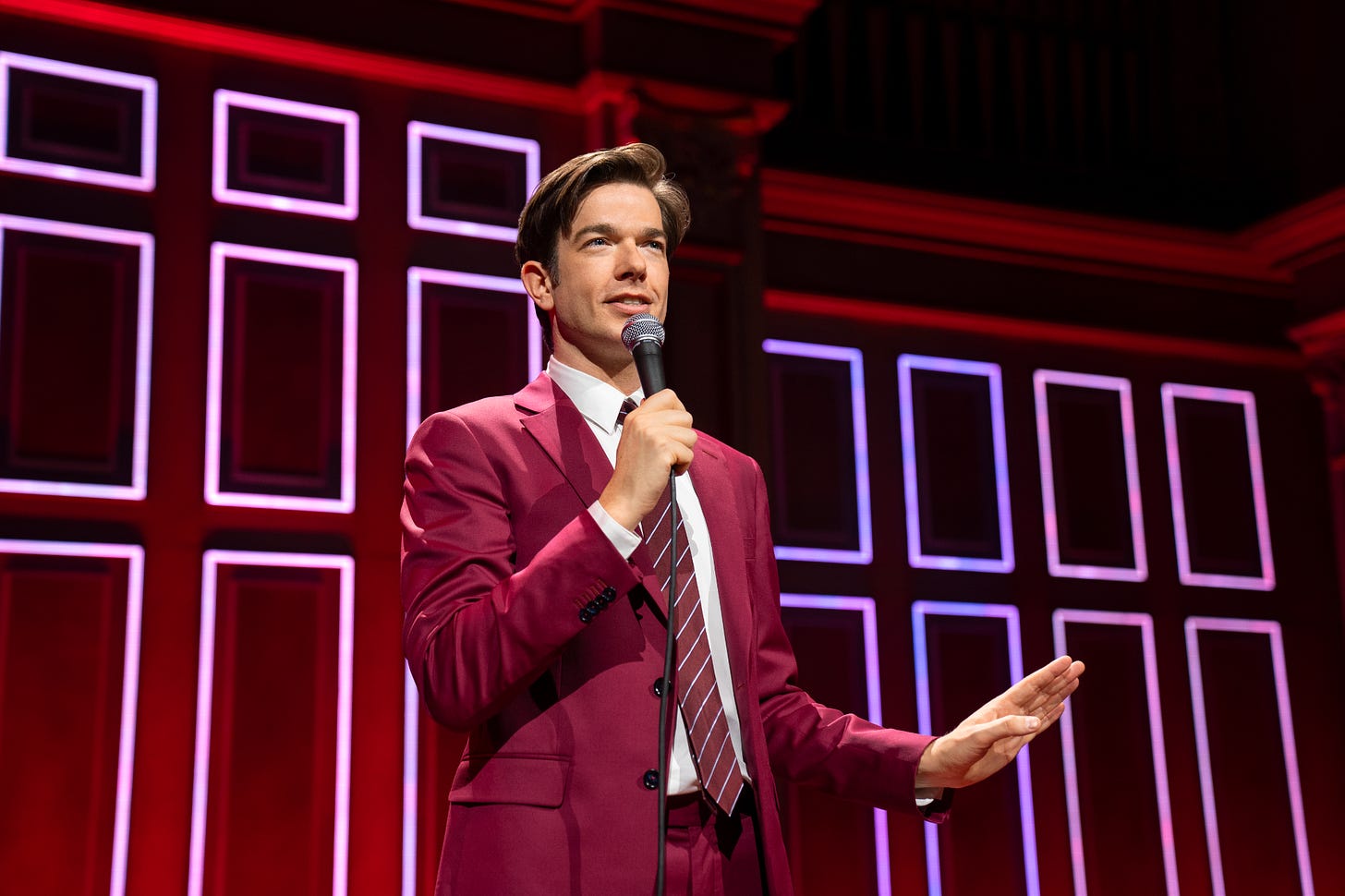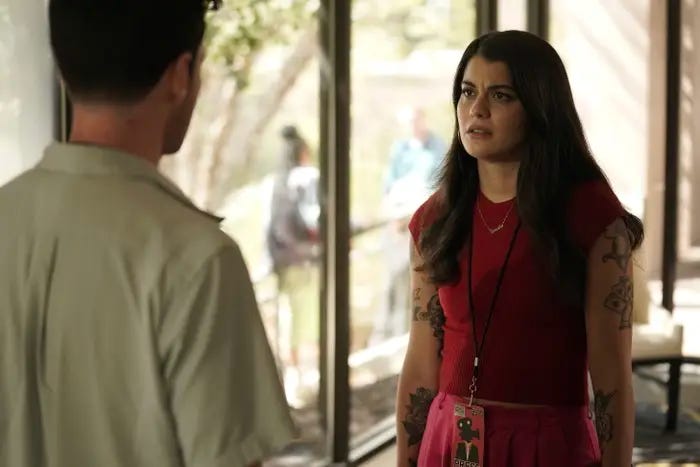What if…we didn’t rush recovery narratives?
On Baby J, Single Drunk Female, Sound of Metal, and me
Hello!
I was pulling together another algo-free reco list, writing the little blurb for Single Drunk Female, when I realized I had so much more to say about the recovery narrative landscape more generally. So here’s that!
They tell you not to make any major changes — like moving or having a baby — in your first year of recovery. The new John Mulaney Netflix special, Baby J, is proof they should also add “film a stand-up special” to this list. Maybe it was filmed just outside that one-year period. It doesn’t matter. Because time is a human concept and the amount needed for perspective can’t be precisely quantified. My point here is not that it’s unfunny (or at least that’s not a criticism road I have any interest in going down). But rather that there’s not much “there” there. And this isn’t necessarily Mulaney’s fault.
Early sobriety is fucking weird! And it is VERY tempting to turn that all-encompassing strangeness and pain into art. Everything feels sharp and spiky, like the aura you get before a migraine. Except not everyone gets migraines, so it’s extra important to find a way to show other people what the aura looks and feels like so they can truly see you. I look back at all the eager, know-it-all ideas I half-baked in early sobriety and remain eternally grateful that no one greenlit “PITCH: Sexy Unique Recovery: One Day at a Time With DJ James Kennedy.” If I were a famous person, I would not have been given this gift.
To me, art focused on early recovery is like doing a biopic and only showing a particularly dramatic birth scene. Sure, some visceral crowning footage and a whole lot of panicked screaming really get the people going, but what happens next? That’s chapter one, and it’s a bummer that most recovery narratives onscreen don’t go much further. Or maybe they leave the labor and delivery wing, yet somehow still land right back there at the end, the baby being reborn after a “right-on-time” act three relapse. Let that recovery baby grow up into a freaky little teen! A lot of us do, in fact, move past recovery year one. Though if your only experience with people in recovery is onscreen, you might not know this.
Maybe it isn’t that the general public of normies (people not in recovery) doesn’t realize people exist outside of recovery year one, but that imagining that life is really challenging. Before I got sober myself — thanks to a lifetime of media that largely treads the same tropes — I saw it as a mutually exclusive binary. There were people who were not addicts, and there were people who were actively addicted to something. This is not my reality. And this is not the reality in Single Drunk Female, a show on Hulu/Freeform that would be a disservice to call “for teens.”
Season one of Single Drunk Female follows twentysomething Sam Fink’s journey to get sober after a public meltdown. The first season treads some predictable ground but works because of an impeccable supporting cast, particularly the other folks Sam meets and learns from in recovery. Also, everyone in this show is very hot. Season two opens with (spoiler, but I’d argue it shouldn’t be) Sam eighteen months sober, and this is where the magic starts. Of course, because it’s a show about addiction, there’s still a relapse lightly looming. Or maybe we, as viewers, expect the relapse, add the ominous tension in ourselves in some twisted Chekov’s gun situation.
I only recently became aware of how hard-wired the relapse expectation is in me. Have y’all seen Sound of Metal? If not, skip this paragraph. It’s my favorite recovery narrative to date because drummer Ruben is given the latitude to skip the “addict” vs. “non-addict” binary (we first meet him several years into sobriety) and spend the entire film in the perpetual liminal space of recovery. He’s on solid ground in his recovery but still acts exactly as a person in recovery would when faced with rapidly increasing deafness — with nuance and raw humanity. The final act had my jaw on the ground, not because it’s the typical “he’s seemingly lost everything” onscreen relapse I saw coming. Instead, because it wasn’t that at all. Ruben doesn’t relapse. In the final park bench scene, he instead takes a tiny (albeit cinematic) moment to bask in acceptance and gratitude. Morning pages! They work!
Season two of Single Drunk Female explores that same liminal space. Sober Sam isn’t “back to some version of pre-alcohol Sam” because that person does not exist. You’re never fully “recovered” — recovery is a continual state of existence, which can be very challenging for a person whose default mode of operation is to chemically control every situation. And we get to see Sam dealing with those uncomfortable feelings openly. The question is no longer “Did you drink?” it’s “What did you do instead when you wanted to?”
And that question is where the richness of recovery is found. It’s not what we take away but what we build in the gaping hole left behind. Sam, Ruben, me — we can’t go back up the birth canal to some pre-addict self. At least not in this universe. And the gifts of a nuanced later-recovery narrative reinforce how going back isn’t just absurd, it’s undesirable. The person built out of the wreckage is going to be more interesting. It turns out raw-dogging reality, actively facing your shit on a daily basis won’t necessarily make you a better person (addicts are still imperfect humans), but it will make you more yourself.
Maybe that’s the source of disquietude I felt watching Baby J. Even with all the belabored song and dance Mulaney does to convince us he’s “not like before,” he’s still doing “before” (albeit with a different color suit and some edgier anecdotes) while simultaneously attempting to show us he’s managed to reach a state of “after.” It’s hard to watch someone try to jump from the present uncertainty of recovery to solid ground they’ll never reach. Going back is futile, and a pure future state doesn’t exist. The only way out is through. A “through” that will last forever. And it’s such a shame not to see the beauty in that.
This newsletter brought to you by:
Drinking cold brew from a Virgin River “Jack’s Bar” novelty rocks glass
Many Roads, One Journey: Moving Beyond the 12 Steps by Charlotte Kasl
A refrigerated Swiss Cake Roll






Beautiful, powerful, and sooo spot on! I’m loving SDF so much.
What's interesting to me about Mullaney is that we (?) are trying to put a narrative on a real person. (I mean I do this all the time, I'm always trying to force a narrative structure on my life) but w/ Mullaney we're not sure if it's a redemption story or not.
I'm not sure if this makes sense.